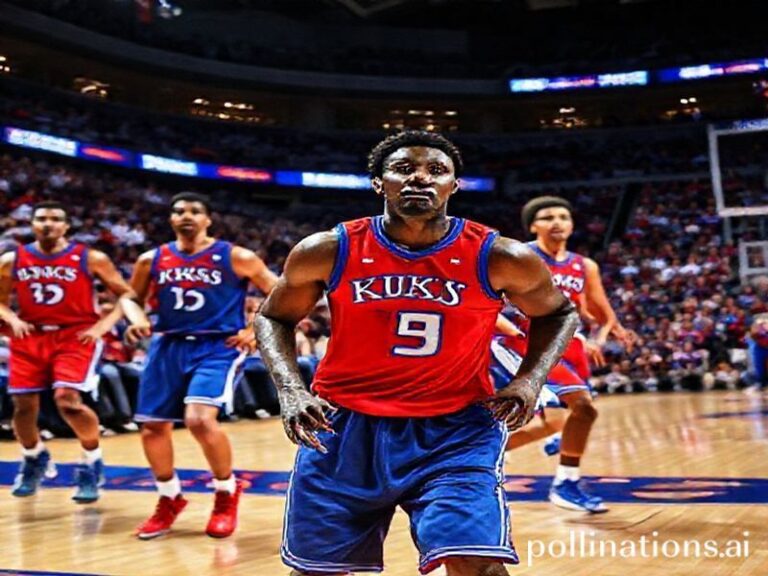Touchdowns in the Time of Cholera: How Juwan Johnson Accidentally Became the World’s Shortest Moral Holiday
Juwan Johnson and the Cheerful Apocalypse of the Global Touchdown
By Our Man in the End-Zone, filing from a bar with suspiciously sticky floors in Paris
It is 3:17 a.m. Central European Time when Juwan Johnson, 6’4″ and technically a New Orleans Saint, hauls in his seventh touchdown catch of the season somewhere above the Mason-Dixon line. Half the planet is asleep, the other half is doom-scrolling about glaciers, and yet a 27-year-old from Stratford, New Jersey has managed to remind us—without even trying—that the United States still exports something besides inflation and drone footage: the ritualized violence we politely rebrand as fantasy points.
From Lagos living rooms to Manila sports bars, Johnson’s name flickers across betting apps like a tiny, pixelated prayer candle. He is the living embodiment of late-stage capitalism’s sweetest paradox: a man who makes millions for catching an oblong leather egg while the world’s oceans acidify faster than your uncle’s Facebook feed. One can almost hear the global collective shrug: “Well, at least someone’s winning.”
The international implications are, admittedly, absurd. In Berlin, a startup founder streams the game on two phones—one to watch, one to monitor his DraftKings portfolio—while his co-founder lectures a venture capitalist about “verticalized synergy.” The VC nods, but only because Juwan just stiff-armed a linebacker into next week’s unemployment figures. In São Paulo, a group of schoolteachers pool their reais on an under/over parlay, believing—correctly—that American football is the only arena where imperial measurements still matter. And in Seoul, a K-pop idol live-tweets the touchdown in English, because the algorithm likes touchdowns almost as much as it likes moral outrage.
Johnson himself is an accidental geopolitical metaphor. Undrafted out of Oregon, he ping-ponged between practice squads, a human reminder that even in the meritocracy-obsessed NFL, merit is negotiable if you have long arms and longer patience. The French, ever alert to existential nuance, have already compared his career arc to Albert Camus reincarnated as a red-zone specialist: absurd, repetitive, but occasionally transcendent.
Meanwhile, the NFL’s international push—games in London, Munich, Mexico City—means Juwan’s highlight reels now autoplay in languages he doesn’t speak. A grandmother in rural Maharashtra watches him high-point a fade route and thinks, “Ah, so this is why my grandson wants to leave engineering.” The league, ever hungry for new markets, has begun subtitling touchdown celebrations like they’re UNESCO heritage artifacts: “Spartan, Hoplite, Dab—repeat after me.”
The broader significance? Johnson’s touchdowns are tiny morale boosts in a world that’s otherwise rationing hope like 1970s toilet paper. Every time he spikes the ball, carbon emissions tick up another fraction, sure, but so does the fleeting illusion that maybe—just maybe—we can still engineer a perfectly timed fade route against entropy. It’s the same delusion that keeps Tokyo commuters buying lucky cat keychains and London bankers ordering oat-milk lattes: the belief that micro-victories can offset macro-catastrophes.
And so we watch, from Reykjavik ramen shops to Nairobi co-working spaces, as Juwan Johnson pirouettes into the end-zone. Commentators call it athleticism; the rest of us call it a two-second reprieve from the news cycle. Somewhere, a data analyst in Toronto recalculates win probability while the Arctic melts audibly in the background. He does not stop watching. None of us do. Because if the world insists on ending, we might as well keep score while it happens.
In the final accounting, Juwan Johnson is not saving the planet, curing crypto, or brokering peace in the Caucasus. He is merely catching passes and cashing checks, which in 2023 counts as an act of radical optimism. The rest of us? We’ll keep refreshing the box score, pretending the numbers mean something, knowing they don’t, and cheering anyway—because the alternative is silence, and silence doesn’t come with push notifications.







